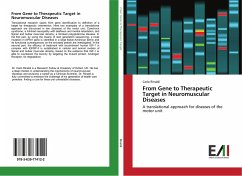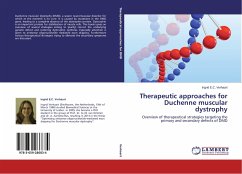
From Gene to Therapeutic Target in Neuromuscular Diseases
A translational approach for diseases of the motor unit
Versandkostenfrei!
Versandfertig in 6-10 Tagen
32,99 €
inkl. MwSt.

PAYBACK Punkte
16 °P sammeln!
Translational research spans from gene identification to definition of a target for therapeutic intervention. Here two examples of a translational approach are discussed in two diseases of the motor unit: Cowchock syndrome, a X-linked neuropathy with deafness and mental retardation, and Spinal and bulbar muscular atrophy, a X-linked polyglutamine disease. In the first part, by using the means of next generation sequencing, a novel mutation in AIFM1 gene is identified in a large Italian-American family and its functional consequences on the encoded protein are investigated. In the second part, ...
Translational research spans from gene identification to definition of a target for therapeutic intervention. Here two examples of a translational approach are discussed in two diseases of the motor unit: Cowchock syndrome, a X-linked neuropathy with deafness and mental retardation, and Spinal and bulbar muscular atrophy, a X-linked polyglutamine disease. In the first part, by using the means of next generation sequencing, a novel mutation in AIFM1 gene is identified in a large Italian-American family and its functional consequences on the encoded protein are investigated. In the second part, the efficacy of treatment with recombinant human IGF-1 in complex with IGFBP-3 is established in cellular and animal models of Spinal and bulbar muscular atrophy, based on the evidence that IGF-1 is able to counteract the toxicity by targeting the mutant protein, Androgen Receptor, for degradation.












